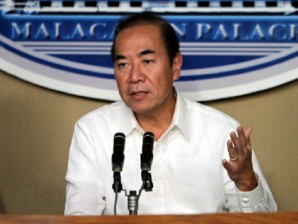MANILA, Philippines — An undisclosed number of contractors and suppliers have been using fake bidding and performance bonds, as well as credit lines from banks, in getting contracts for millions, if not billions, of pesos worth of government infrastructure projects, Public Works and Highways Secretary Rogelio Singson said on Monday.
The DPWH learned about the irregular practice from the local “bankers’ group,” Singson also disclosed.
In a statement, he cited “feedback from the bankers’ group that bid and performance bonds issued by some construction companies and suppliers turned out to be fictitious because they had no authority from banks which supposedly issued them.”
Singson did not identify the erring contractors and suppliers, but stressed “utmost diligence should be exercised in accepting surety bonds for contracts covering infrastructure projects since these amounts are supposed to guarantee satisfactory completion of DPWH projects.”
“The authenticity of a bond, which is a written guaranty from a third party, usually a bank or an insurance company, must be checked with the bank itself or the Insurance Commission,” he also emphasized.
The DPWH head noted that “as a collateral deposit of good faith money, the department requires the posting of a bond to qualify the contractor to bid for a project contract. When the contract is awarded to the winning bidder, a performance bond will then be required as a security to the contract completion.”
Under Article 8, Section 27 of Republic Act No. 9184, or the Act providing for the Modernization, Standardization and Regulation of the Procurement Activities of the Government, “all bids shall be accompanied by a bid security, which shall serve as a guarantee that after receipt of the Notice of Award, the winning bidder shall enter into a contract with the procuring entity within the stipulated time and furnish the required performance security.”
In the event a contractor gets bankrupt or if the contractor fails to complete the project according to the plans and specifications cited in the DPWH contract, the government is guaranteed compensation for the monetary loss or liquidated damages equivalent to the performance bond.
According to Singson, the DPWH will also be more strict in verifying the credit lines of contracts and suppliers.
He directed the agency’s regional directors to “encourage contractors to avail of the various loan programs of state-run financial institutions, such as the Lank Bank and the Development Bank of the Philippines, to boost their financial capability in handling infrastructure projects.”
Some of the banks are also offering equipment financing and leasing programs, which will make contractors highly capable of completing projects on time, according to Singson.
Meanwhile, the DPWH warned contractors with defective projects that they would no longer be eligible to bid for future government projects.
It cited Republic Act No. 9184, otherwise known as the Government Procurement Reform Act of 2003, which called for “corrective or repair works on any defects in the completed projects within the warranty period” as prescribed in project contracts.
The law also warns against the use of inferior materials and poor workmanship in public works projects.
“If an erring contractor fails to comply within the 90-day period to do the required repair works, their performance security bond will be forfeited and the appropriate repair works will be undertaken by the concerned DPWH field unit,” said Singson.
He asserted that DPWH “civil works procuring units – project management offices and regional and district offices – need to be on a tight watch and guarantee that contractors perform their responsibilities and obligations which are clearly stated in their contracts.”
Singson added, “under the department’s right quality thrust, we have tightened project inspection and quality assurance by engaging private firms in the inspection of DPWH projects nationwide.”
